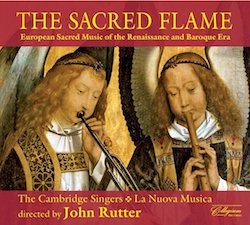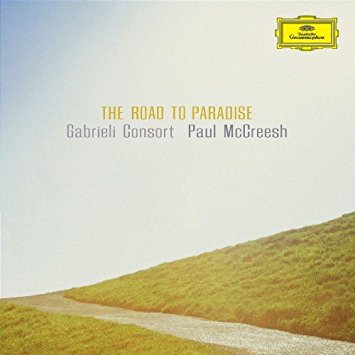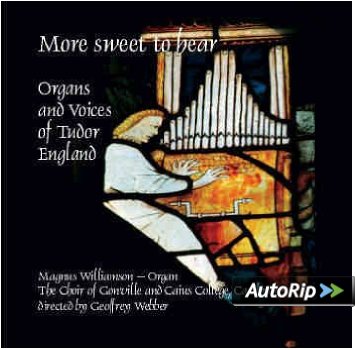The big advantage of a collection is that you can sample a whole range of composers of the period at one go. It also gives more variety of style and approach. These collections have been specially selected to fit even if you have a number of single-composer CDs. While there will be some overlaps, there are also plenty of gems that make each CD worth owning.

The Sacred Flame - Cambridge Singers
I'll be honest, my mental image of the Cambridge Singers is of rather heavy handed singing, suitable for John Rutter's jolly carols, but not exactly competition for the Sixteen. However in this collection of Renaissance and Baroque they have proved they can do subtlety too. The Monteverdi pieces bounce along with just enough lightness. There's a wonderful range of the best music here. Gesualdo's O vos omnes, for example, is full of 'he can't do that!' moments - it's electrifying. Buxtehude's chunky and jubilant Magnificat adds a little light relief among the exquisite likes of Victoria and Josquin Desprez... and it runs through neatly through Schütz to the (relatively) trendy 'new' music of Mr Bach. All in all a great collection.
- Gabrielli - Jubilate Deo
- Monteverdi - Beatus vir, Christe adoramus te, Cantate domino
- Palestrina - Sicut cervus, Exsultate Deo
- Anerio - Christus factus est
- Gesualdo - O vos omnes

The Road to Paradise - Gabrieli Consort
Effortlessly and beautifully sung by the Gabrieli Consort under Paul McCreesh, this is one of the best collections of unaccompanied church music we've ever come across. Not only is pretty well everything here a gem, many of them are relatively unknown, and unlikely to be on other collection CDs. The range is wonderful. There is gorgeous polyphony on the Parsons piece, and though Britten’s Hymn may be better known I had forgotten just how hair raising it is until hearing this electrifying performance. Media vita is not one of Sheppard's best, though it does have some of his trademark "wow!" clashes and builds, and at 19 minutes is quite a tour-de-force. The lyrical Richard Rodney Bennett piece has rather King's Singers-y harmonies (none the worse for that), while we shouldn't underrate Tavener's Song for Athene just because it was well known from Diana's funeral. Other pieces of note include the simpler but satisfying Sheppard In Pace, the moving Harris anthem and Holst's ethereal Nunc - topped by a stunning Amen. Altogether, a cracker.
Tallis - Misere nostri, Chant - Jacet granum, clangat pastor, Parsons - Ave Maria, Britten - A Hymn to the Virgin, Byrd - Christe qui lux es et dies, Sheppard - Media vita in morte sumus, Bennett - A Good-Night, Tavener - Song for Athene, Sheppard - In pace in idipsum, Holst - Nunc Dimittis , Harris - Bring us, O Lord God, Howells - Take him, Earth, for cherishing, Chant - In paradisum

More Sweet to Hear - Choir of Gonville & Caius, Cambridge/Magnus Williamson
A period piece, subtitled 'organs and voices of Tudor England,' this CD provides a pure illustration of the organ sound expected by Tudor composers using two reconstructed Tudor organs. Voices are provided by the not particularly well known, but fine, choir of Gonville & Caius College, Cambridge. The CD splits into three, starting with early Tudor choral pieces where the organ is the prime interest, then a mixed batch of pure organ and choral secular pieces, followed up by a collection of later Tudor works. The first set, including the opening Burnett Te Deum, are perhaps the least interesting and will probably appeal more to period specialists or organ enthusiasts than choral fans - the fauxbourdons in the Burnett, for instance, give the organ a lot more interesting things to do than the singers. In the second set there are some intriguing organ sounds reminiscent of the conventional instrumental music of the period (the bouncy The trowmppettus for example), and some surprises from the great church musicians of the time, notably Sheppard (if rather boringly non-clashing for this most innovative composer) and Tallis.
In the third section, Byrd and Morley probably provide the most satisfying music from the delicate organ piece Ut re me fa sol la to the more familiar sounds of Teach Me O Lord and the Magnificat from the Second Service. I particularly liked Morley's Out of the Deep, which while rarely unpredictable was an excellent and relatively rarely heard piece. It was only really in this section that the Caius choir could be judged. The sound was good, if a little dull on top - it's odd that having gone to the effort of using period organs, a choir with a very obvious mixed sound was used here. For those used to more modern organs, the instrumental sound is a little thin to begin with, but the CD certainly provides a fascinating insight into the bridge between the early tradition and the church music most of us are familiar with. Recommended.